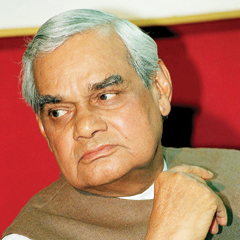A gentle face of Indian nationalism
 Atal Bihari Vajpayee
Atal Bihari VajpayeeNEW DELHI: Three-time Indian prime minister Atal Bihari Vajpayee has died, current leader Narendra Modi said yesterday of the ailing 93-year-old who had been hospitalized.
"Atal Ji's passing away is a personal and irreplaceable loss for me," Modi said in a tweet yesterday, using a Hindi-language honorific. "It was Atal Ji's exemplary leadership that set the foundations for a strong, prosperous and inclusive India in the 21st century."
Vajpayee had battled poor health for years but his condition deteriorated sharply in recent days. The former premier was being treated at the All India Institute of Medical Sciences (AIIMS) in Delhi, where he was admitted nine weeks ago with health complications.
"Unfortunately, his condition deteriorated over the last 36 hours and he was put on life support systems. Despite the best efforts, we have lost him today," AIIMS said in a statement.
"We join the nation in deeply mourning this great loss." His waning health sparked a flurry of visits from top dignitaries yesterday, including Modi and senior cabinet ministers.
Vajpayee, a former journalist and poet-turned-politician, was credited with helping lay the foundations for the meteoric rise of the Bharatiya Janata Party (BJP), the right-wing political powerhouse that rules India today.
He was hospitalized more than two months ago with a kidney infection and chest ailment but illness has kept him out of the public eye for years.
Vajpayee, a former journalist and poet turned politician, is credited with helping lay the foundations for the meteoric rise of the BJP, the political powerhouse that rules India today.
Vajpayee was one of the few opposition lawmakers inside parliament when India's first prime minister, Jawaharlal Nehru, still held office.
His more than five-decade long career peaked in the 1990s, when his masterful oratory attracted tens of thousands of people to his rallies across the country.
He also became the first non-Congress leader since India's independence in 1947 to complete an entire term in office as head of a BJP-led ruling alliance between March 1998 and May 2004.
Many top ministers in cabinet today-including Modi-were protégées to Vajpayeeand his deputy Lal Krishna Advani in past administrations.
He embarked on a historic bus ride to arch-rival Pakistan in 1999 and held talks with then-premier Nawaz Sharif in the city of Lahore. But his peacemaker image was shattered when Pakistan-backed forces pressed over the disputed Kashmir border and he later helped ramp up tensions in South Asia by testing nuclear weapons in 1998.
Vajpayee withdrew from the public eye after a BJP-led alliance suffered a shock defeat in 2004.
He has since rarely been seen or heard in public. It is widely reported that he suffered a stroke in 2009 which largely confined him to his New Delhi residence.
He continues to enjoy devotion in many parts of the country, especially in key bellwether Hindi-heartland states in north and central India.
Vajpayee's often conciliatory tone, and poetic jibes directed at opponents, attracted popularity on both sides of the political divide. - AFP










